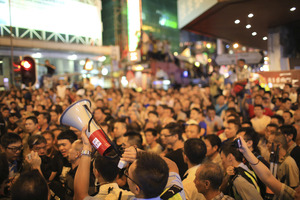 Hong Kong Chief Executive Leung Chun-ying doesn't get it as volatile street protests against China enter their fourth week of the 'Occupy Hong Kong' movement. The students want Hong Kong voters to have the right to nominate and elect their own leaders.
Hong Kong Chief Executive Leung Chun-ying doesn't get it as volatile street protests against China enter their fourth week of the 'Occupy Hong Kong' movement. The students want Hong Kong voters to have the right to nominate and elect their own leaders.Communist China argues that is out of the question because Beijing, theoretically, is Hong Kong's erstwhile landlord. China took over Hong Kong from the British in 1997 after the Queen's 100-year land lease expired.
China says it will start picking Hong Kong's various executives beginning in 2017.
Leung, a wealthy bureaucrat, is a hand-picked leader by China. With a straight face, he told a small group of foreign reporters this week that if the students' demands are met, it would mean the poor and the working class among Hong Kong's 7.2 million residents would dominate elections.
Duh? Mr. Leung, you just don't get it. That's exactly what the students want.
He says he will try to meet again with the students to see if a compromise might be reached on selecting Hong Kong and Beijing representatives to form a committee for nominating near-future election candidates.
That idea should go over with the students like a lead balloon. China does not like to be put down by anybody and certainly not by mere students reacting on the world's television stage.
Despite his attempt to show that he might be willing to meet the students half way, Leung also warned he and Beijing wouldn't put up with the protests forever. But he didn't come right out and say what he and China might do to stop the protests.
Right now, Hong Kong police have been responding with barricades, tear gas, clubs and rubber bullets to try and disperse the nightly crowds.
Observers monitoring the chaos in Hong Kong fear Chinese leaders, patient as they appear to be, might eventually demonstrate as they did in June 1989 at Tiananmen Square in the center of Beijing.
That's when China rolled out its tanks and other heavy artillery to quash a seven-week student uprising. An estimated 2,600 protesters were killed and another estimated 500 critically injured as the Chinese military used live ammunition to banish the protesters.
The students and other friends were mourning the death of former Communist Party General Secretary, Hu Yaobang, a liberal reformer. He was deposed after losing a power struggle with Beijing hardliners over the direction of political and economic reforms.
The Chinese government was widely condemned internationally for its use of force against the protesters. Western governments imposed economic sanctions and arms embargoes. Chinese Communist heads were livid over what they considered purely an internal domestic situation.
Will Downtown Hong Kong soon become another Tiananmen Square? Stay tuned. The drama is only beginning.

 By
By 